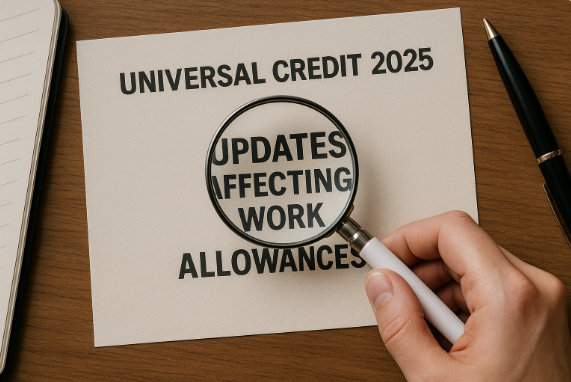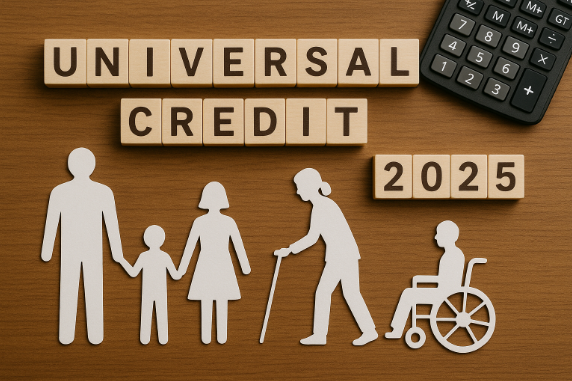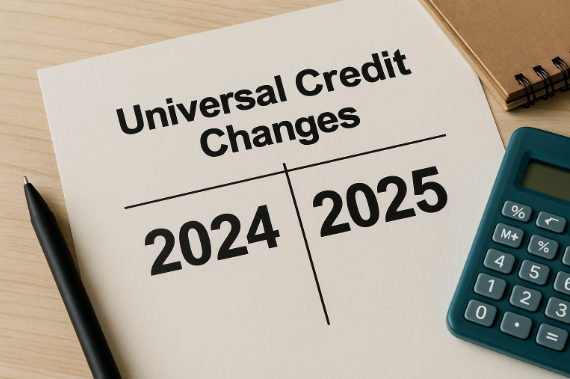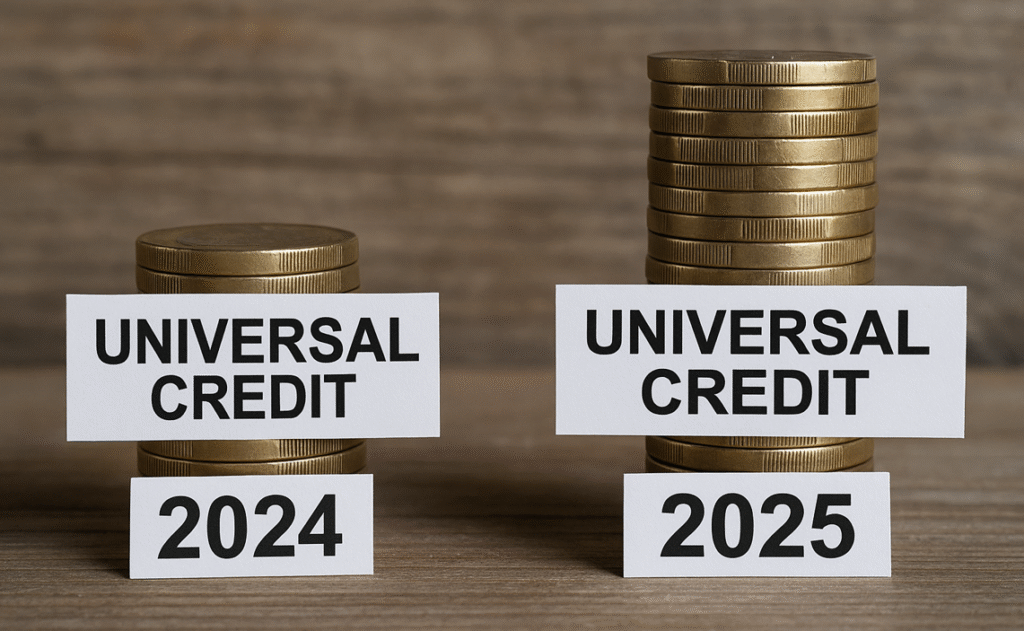Universal Credit is one of the most important welfare benefits in the UK, and every year it undergoes adjustments to reflect living costs and government policy. The UK Universal Credit change in 2025 brings new rules and updated payment amounts that affect millions of households. Whether you’re in work, out of work, or caring for a family member, it’s essential to understand what has changed and how it may impact your income.
UK Universal Credit Change 2025
-
6.7% increase to standard allowance, child element, and carer element from April 2025.
-
Work allowances rise to £673 (with housing) and £1,081 (without housing).
-
Local Housing Allowance (LHA) reset to match the 30th percentile of local rents.
-
Benefit cap lifted to £27,017 (London) and £23,496 (outside London).
-
Extra £299 cost-of-living payment plus winter fuel support for vulnerable groups.
What are the latest UK Universal Credit changes in 2025?
Why has the government introduced new Universal Credit changes in 2025?
The government updates Universal Credit every April to align with inflation and cost-of-living pressures. According to the Department for Work and Pensions (DWP), benefits will rise by 6.7% from April 2025, based on the September 2024 inflation rate. This aims to help low-income households cope with rising prices for essentials like food, housing, and energy.
What are the key updates announced by the Department for Work and Pensions?
The UK Universal Credit change in 2025 introduces several important updates, including:
-
A 6.7% increase to the standard allowance, child element, and carer element.
-
A rise in work allowances, allowing claimants to keep more of their earnings.
-
A reset of Local Housing Allowance (LHA) to cover the 30th percentile of rents in each area.
-
Additional Cost of Living Payments for vulnerable groups such as pensioners and disabled claimants.
How do these Universal Credit changes affect existing claimants?
If you already receive Universal Credit, your payment will automatically increase in April 2025. You do not need to reapply, but you should report any changes in circumstances (such as moving home, changes in earnings, or childcare costs) through your online Universal Credit journal to make sure you get the correct payment.
How do Universal Credit 2025 updates affect work allowances?

What is the current work allowance for Universal Credit claimants?
The work allowance is the amount you can earn before your Universal Credit is reduced. In 2024, the allowance was:
-
£631 per month if your claim includes housing costs.
-
£1,013 per month if your claim does not include housing costs.
How has the work allowance changed in 2025 compared to 2024?
From April 2025, both rates increase by 6.7%:
-
£673 per month (with housing element).
-
£1,081 per month (without housing element).
Who benefits most from the work allowance changes?
-
Working parents.
-
People with limited capability for work (due to illness or disability).
-
Families balancing part-time work with childcare.
This change means claimants can keep more of their earnings before the Universal Credit taper rate (55p reduction for every £1 earned) is applied.
What changes have been made to the benefit cap and housing support?
How is the benefit cap adjusted under the 2025 Universal Credit system?
The benefit cap sets a maximum amount households can receive through Universal Credit (UC) and certain other benefits. In 2025, the government increased the cap by 6.7%, in line with inflation. This means households in and outside London will now have a slightly higher ceiling for their benefits.
-
Families in London will see their cap rise from £25,323 to approximately £27,017 per year.
-
Families outside London will see it rise from £22,020 to about £23,496 per year.
This adjustment is important because in previous years, many families hit the cap despite rising rent and living costs. By lifting it, the government is trying to make sure that larger families and those in high-cost areas are not unfairly disadvantaged.
What changes are made to the housing element in 2025?
The housing element of Universal Credit is linked to the Local Housing Allowance (LHA). From April 2025, the LHA will be reset to cover the 30th percentile of local rents, instead of being frozen at outdated 2020 levels.
In practice, this means:
-
Tenants renting privately will see their housing support better reflect the actual market rent in their area.
-
Claimants in high-rent regions, such as London, Manchester, and Bristol, could receive an extra £50–£100 per month towards rent.
This change helps reduce the gap between what Universal Credit pays and what renters are charged.
How will these changes impact renters and homeowners?
-
Renters: Private renters benefit most from the LHA reset, as many previously had to cover large rent shortfalls from their own income.
-
Homeowners: While they don’t receive housing costs support, they may still access Support for Mortgage Interest (SMI) loans if struggling with repayments.
-
Young adults under 35: Some will still be restricted to the “shared accommodation rate,” but the LHA reset means even this limited rate will increase.
How will Universal Credit changes in 2025 impact families and carers?

What financial support is available for parents under the new changes?
Families with children see meaningful increases under the 2025 Universal Credit update:
-
First child born before April 2017: rises from £333.33 to £355.65 per month.
-
Additional children: rises from £287.92 to £307.26 per month.
Parents who work also benefit from higher childcare cost reimbursements:
-
Up to £1,014 per month for one child.
-
Up to £1,739 per month for two or more children.
This makes it easier for parents, particularly single parents, to balance work with childcare.
How do the 2025 Universal Credit updates support unpaid carers?
Carers are one of the groups most impacted by Universal Credit reforms. In 2025, the carer element rises from £197.91 to £210.86 per month.
To qualify, you must:
-
Care for a disabled person for at least 35 hours per week.
-
Be caring for someone who receives disability benefits such as PIP or DLA.
This uplift acknowledges the vital role carers play and gives them extra financial security.
Will child element payments increase in 2025?
Yes. For the majority of families, both the first child element and additional child element increase by 6.7%. This is especially important as families face higher costs for food, clothing, and school-related expenses.
What support is available for cost of living pressures under the new Universal Credit system?
How does Universal Credit 2025 address rising living costs?
Universal Credit continues to be uprated annually by inflation, but the government also confirmed additional Cost of Living Payments to directly help low-income households with soaring bills.
Are there additional one-off cost of living payments in 2025?
Yes. Eligible households will receive:
-
A £299 one-off cost of living payment in Spring 2025.
-
Extra winter fuel support for pensioners and people with disabilities.
-
Targeted support for families on legacy benefits transitioning to Universal Credit.
These payments act as short-term relief for the sharp increase in essentials like energy, rent, and groceries.
Which groups are most eligible for extra cost of living support?
The payments are not universal. They are reserved for:
-
People on means-tested benefits, such as Universal Credit, Income Support, or Pension Credit.
-
Pensioners eligible for the Winter Fuel Payment.
-
Disabled claimants receiving PIP, DLA, or Attendance Allowance.
This targeted approach aims to protect the most vulnerable, but some groups — especially working households just above the eligibility threshold — may still struggle.
Comparison of Universal Credit 2024 vs 2025 changes

What were the main Universal Credit rules in 2024?
In 2024, Universal Credit rose by 6.7%, but housing support lagged behind real rental prices due to frozen LHA rates. Many families continued to struggle with shortfalls in rent support.
How do the new 2025 rules differ from 2024?
The biggest differences in 2025 are:
-
Work allowances are higher, allowing claimants to keep more earnings.
-
Housing support reflects current rent levels through updated LHA.
-
The benefit cap has been increased, reducing the number of households affected.
Table: Side-by-side comparison of Universal Credit changes
| Element | 2024 Amount | 2025 Amount | % Increase |
|---|---|---|---|
| Standard allowance (single) | £368.74 | £393.38 | 6.7% |
| Work allowance (with housing) | £631 | £673 | 6.7% |
| Child element (first child) | £333.33 | £355.65 | 6.7% |
| Carer element | £197.91 | £210.86 | 6.7% |
Conclusion
The UK Universal Credit change in 2025 brings higher payments, updated housing support, and more generous work allowances. These updates are designed to ease cost-of-living pressures and give families, carers, and workers extra stability. While challenges remain, staying informed and keeping your claim up to date will help you make the most of the support available.
FAQs on UK Universal Credit Change 2025
How much will Universal Credit increase in April 2025?
Universal Credit payments will rise by 6.7% from April 2025, in line with inflation. This increase applies to the standard allowance, child element, and carer element.
What is the new standard allowance for Universal Credit in 2025?
From April 2025, the monthly standard allowance will be around £393.38 for a single claimant aged 25 or over. Rates vary depending on your age and household status.
How much can you earn before Universal Credit is reduced in 2025?
The work allowance has increased to £673 per month (if your Universal Credit includes housing support) and £1,081 per month (if it doesn’t). Above these thresholds, the 55% taper applies.
Is the Universal Credit housing element changing in 2025?
Yes. From April 2025, the Local Housing Allowance (LHA) is reset to cover the 30th percentile of local market rents, meaning support will better match real rent costs.
What is the benefit cap for Universal Credit in 2025?
The benefit cap rises by 6.7%. The new maximum is £27,017 per year in London and £23,496 per year outside London.
When do the Universal Credit changes take effect in 2025?
All changes, including higher payment rates, updated housing support, and the new benefit cap, come into effect from April 2025.

I’m Adam Milne, a business writer and co-author at UKBusinessMag.co.uk. I’m passionate about simplifying complex topics—whether it’s tax, startup strategy, or digital marketing—so that entrepreneurs can take action with confidence. With years of experience in small business consultancy, I bring a practical perspective to every piece I write, helping readers turn ideas into results.



